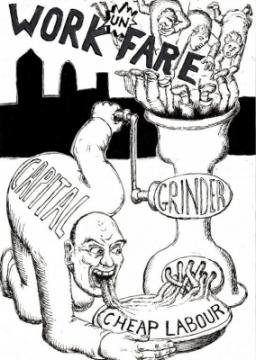International Women’s Day (IWD) is marked each year on the 8th of March, to signify the economic, cultural and political achievements of women and more importantly, all that still has to be achieved in the struggle for women's liberation. 2012 is the 101st anniversary of the day.
International Women’s Day first emerged from the women’s labour movement at the turn of the twentieth century, in North America and Europe. In 1908, in the United States of America, a three month strike of almost 30,000 garment workers, composing mainly of migrant women, almost shut down the garment industry and won most of the workers’ demands, including the right to organise, to bargain collectively, and improved wages and working conditions.
On the 8th of March, 15,000 of the women workers marched through New York to protest child labour, sweatshop working conditions, and to demand the vote for women. A year later in 1909 the first national women’s day was observed when the Socialist Party of America designated March 8th as “Women’s Day” in honour of the garment workers.
In 1910 at the second International Conference of Working Women in Copenhagen, German Socialists, inspired by the actions of US women workers, proposed the establishment of a Women’s Day, international in character, to honour the movement for women’s rights and to build support for achieving universal suffrage for women.
The motion was passed unanimously by over 100 women from 17 countries, representing unions, socialist parties, working women’s clubs, and on 18 March, 1911, International Womens Day was marked for the first time, mainly in Austria, Denmark, Germany and Switzerland, where more than one million women and men attended rallies and demonstrations.
In Vienna, 20,000 women demonstrated, carrying banners honouring the martyrs of the Paris Commune. They demanded voting rights, the right to to hold public office, the eight-hour day, an end to discrimination on the job, the reduction of grocery costs, the legalisation of abortion and the prevention of the approaching First World War.
In Petrograd in Russia on International Women’s Day, March 1917, the working women of the city launched the February revolution. Despite being urged by the Bolshevik leaders not to strike, on March 8 the women of Petrograd stormed the streets, angrily denouncing the Tsar and protesting food prices and bread shortages. Food riots, political strikes and demonstrations followed and within a week the Tsar had abdicated.
International Women’s Day was adopted as an official holiday in Russia after the revolution and as a result was predominantly celebrated in communist and socialist countries. It was celebrated by the communists in China from 1922, and by Spanish communists from 1936.
A few months after the first Women’s Liberation Movement Conference in Ruskin college in Oxford, on 6 March 1971 International Women’s Day was celebrated for the first time in the UK. 4,000 demonstrators marched through London carrying on their banners the four basic demands of the womens liberation movement: for equal pay, equal education and job opportunities, free contraception and abortion on demand, and free 24-hour nurseries.
In 1977 the United Nations General Assembly designated March 8 as the UN Day for Women’s Rights and International Peace and since then IWD has been observed as a significant and popular event all over the world.
In 2007 International Women’s Day sparked violence in Tehran, Iran when police attacked hundreds of men and women who were planning a rally. Last year, an International Women’s Day demonstration was attacked in Cairo’s Tahrir Square. More than 200 men charged the female demonstrators, attacking, groping and sexually harassing them, as police and the military stood by.
In 2005 the British Trades Union Congress passed a resolution calling for IWD to be designated a public holiday in the United Kingdom, however it it is still not a official holiday in the UK. Despite its radical and socialist beginings, IWD in the UK is usually represented by many cultural and political events, public ceremonies and conferences, alongside organised activity by the women’s movement, such as the Million Women Rise march, which have helped to popularise the day.
Though much of the turbulence that surrounded its early days is gone and despite its many ebbs and flows, International women’s day continues to be a day that helps to push women’s issues onto the political agenda and many women continue to see IWD as an important opportunity to review, reflect and act on the political, economic and social struggles of women.
